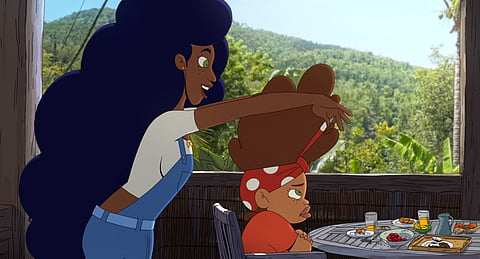16th Annual Children's Film Festival Seattle Brings 'Love and Light' to Virtual Audiences
by Mark Van Streefkerk
The Children's Film Festival Seattle (CFFS) returns for its 16th year with a theme of comfort and hope as we enter the second year of a global pandemic. Presented by Northwest Film Forum (NWFF) February 18—28, the online streaming festival includes 133 live-action and animated films from 36 countries, many of which were made during lockdown. With four feature films and 16 short film programs, the festival intends to uplift and comfort children and their families by inspiring empathy, understanding, and a nuanced view of the world.
Elizabeth Shepherd, director of the CFFS and director of youth programs for the NWFF said, "The theme of our festival this year is 'Love and Light.' The reason we chose that theme is that we['re] sending all the energy of the festival into people's homes … We wanted to make sure what we were showing this year, more than ever before, was very colorful, very uplifting, [and] was going to be a very positive family experience at home."
All films will be viewed by a select youth jury, ages 8—15, who work with mentors to determine prizes and awards at the end of the festival. CFFS also offers three online film workshops for kids (two are still open for registration at the time of this article: Storytelling For Filmmakers and Stop Motion Animation: Playing With Food), free to all regardless of purchasing a festival pass.
The four feature films include: Triple Trouble, Sisters: The Summer We Found Our Superpowers, the 3D animated Louisa: An Amazing Adventure, and Young Warriors, a Portuguese-language film about a family road trip in Brazil.
The short films are arranged in 16 thematic and age-appropriate blocks. "Feathered, Fluffy and Fabulous" is an animated block of short films for ages 2+ about animals and friendships. "Aventuras Asombrosas!" and "Petits Trsors" are Spanish- and French-language programs, respectively, and "Journeys, Genders, and Identity" is a block of films about LGBTQ+ themes as well as neurodivergent kids. Shepherd explained that even a couple of years ago film submissions about LGBTQ+ kids were few and often centered around hardships or challenges. "It's not that way anymore. It's very celebratory," she said. "There's been a shift in consciousness that I think is promising."
"Youth Shine" contains films showing how youth creativity and connection overcome the challenges of COVID-19. The Effects, written by 16-year-old Rosemary Gramajo Quiones, is about a teenager forced to make a difficult decision when her Guatemalan father is threatened with deportation. Harriet: The Black Swan in the Year of COVID-19, by Tacoma Urban Performing Arts Center, is an adaptation of a ballet about the four seasons of Harriet Tubman's life. "It was a heavy lift to all of a sudden take your dance performance and adapt it to a film outside with all those dancers masked and distanced during the pandemic," Shepherd noted. "It's beautiful, it's absolutely beautiful."
"Promise to the Planet" is a series co-presented by the Social Justice Film Festival featuring short films that inspire environmental awareness and action in the face of climate change.
Another collection, "Reel Life Stories," includes a documentary about Nurturing Roots, Beacon Hill's urban farm and community farming program, founded by Nyema Clark, which emphasizes food empowerment and social justice.
This year's CFFS, usually Northwest Film Forum's biggest event of the year, is significant because it marks the beginning of a second year of online programming. Last year's CFFS, scheduled for February 27 to March 8, happened "right as everything was falling apart," Shepherd said. NWFF typically hosts school field trips to view and discuss CFFS films. Last year, the festival was shut down on March 5 and concluded online in May. "I think it's appropriate to do it the same time this year — even though we are still virtual — to mark the year, to say 'We're still here. We're still uplifting content we can bring to you even under these circumstances,'" Shepherd said.
Throughout 2020, NWFF maintained and deepened community partnerships because they were essentially the only Seattle cinema operating completely online. "What we've found, with our film festivals in general, is that we're able to reach people who wouldn't necessarily have an art house cinema in their backyard," said NWFF Executive Director Vivian Hua. "It's just nice to be able to offer sliding-scale tickets for people to be able to view this in their homes, with their families, and have content that's highly curated and meant to create a warm, fuzzy feeling at this time."
Festival passes are available on a sliding scale, pay-what-you-can tier. Purchase your festival pass here.
Mark Van Streefkerk is a South Seattle-based journalist and freelance writer living in the Beacon Hill neighborhood. He often writes about specialty coffee, LGBTQ+ topics, and more. Visit his website at markvanstreefkerk.com and follow him on Instagram at @markthewriter.
Featured image: A still from Vanille, part of the "Petits Trsors," a French-language film program (courtesy of Children's Film Festival Seattle)
Before you move on to the next story …
The South Seattle Emerald™ is brought to you by Rainmakers. Rainmakers give recurring gifts at any amount. With around 1,000 Rainmakers, the Emerald™ is truly community-driven local media. Help us keep BIPOC-led media free and accessible.
If just half of our readers signed up to give $6 a month, we wouldn't have to fundraise for the rest of the year. Small amounts make a difference.
We cannot do this work without you. Become a Rainmaker today!
Help keep BIPOC-led, community-powered journalism free — become a Rainmaker today.


